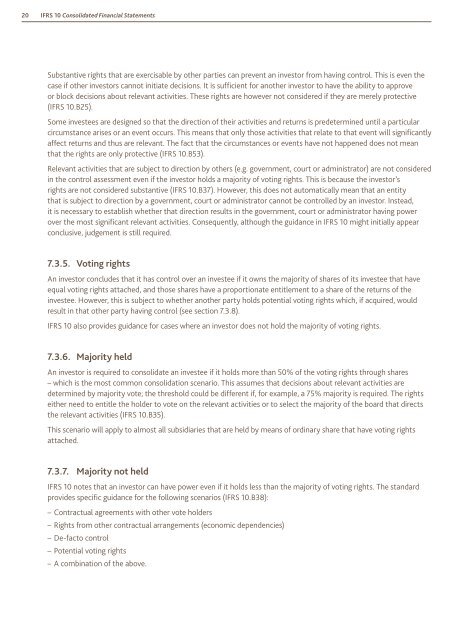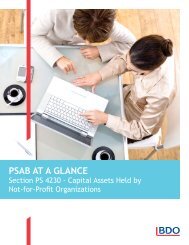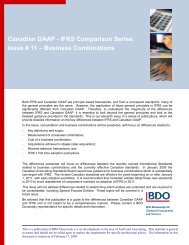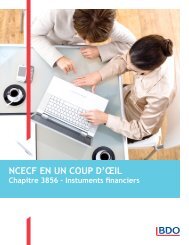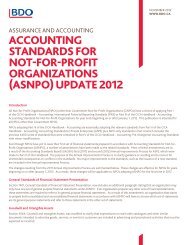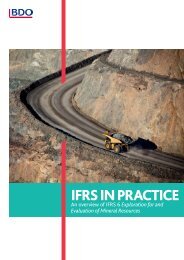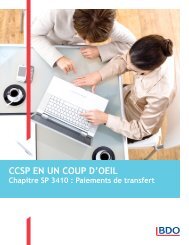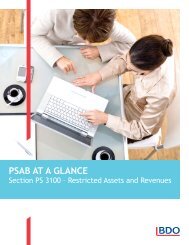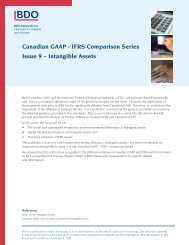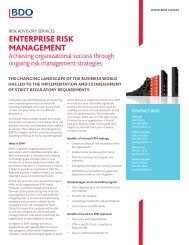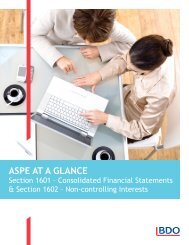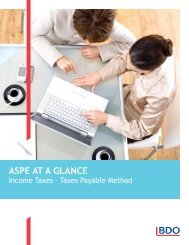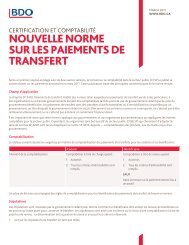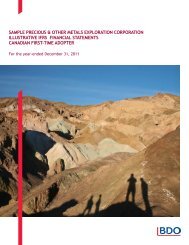Need to Know: IFRS 10 - Consolidated Financial ... - BDO Canada
Need to Know: IFRS 10 - Consolidated Financial ... - BDO Canada
Need to Know: IFRS 10 - Consolidated Financial ... - BDO Canada
- No tags were found...
You also want an ePaper? Increase the reach of your titles
YUMPU automatically turns print PDFs into web optimized ePapers that Google loves.
20 <strong>IFRS</strong> <strong>10</strong> <strong>Consolidated</strong> <strong>Financial</strong> StatementsSubstantive rights that are exercisable by other parties can prevent an inves<strong>to</strong>r from having control. This is even thecase if other inves<strong>to</strong>rs cannot initiate decisions. It is sufficient for another inves<strong>to</strong>r <strong>to</strong> have the ability <strong>to</strong> approveor block decisions about relevant activities. These rights are however not considered if they are merely protective(<strong>IFRS</strong> <strong>10</strong>.B25).Some investees are designed so that the direction of their activities and returns is predetermined until a particularcircumstance arises or an event occurs. This means that only those activities that relate <strong>to</strong> that event will significantlyaffect returns and thus are relevant. The fact that the circumstances or events have not happened does not meanthat the rights are only protective (<strong>IFRS</strong> <strong>10</strong>.B53).Relevant activities that are subject <strong>to</strong> direction by others (e.g. government, court or administra<strong>to</strong>r) are not consideredin the control assessment even if the inves<strong>to</strong>r holds a majority of voting rights. This is because the inves<strong>to</strong>r’srights are not considered substantive (<strong>IFRS</strong> <strong>10</strong>.B37). However, this does not au<strong>to</strong>matically mean that an entitythat is subject <strong>to</strong> direction by a government, court or administra<strong>to</strong>r cannot be controlled by an inves<strong>to</strong>r. Instead,it is necessary <strong>to</strong> establish whether that direction results in the government, court or administra<strong>to</strong>r having powerover the most significant relevant activities. Consequently, although the guidance in <strong>IFRS</strong> <strong>10</strong> might initially appearconclusive, judgement is still required.7.3.5. Voting rightsAn inves<strong>to</strong>r concludes that it has control over an investee if it owns the majority of shares of its investee that haveequal voting rights attached, and those shares have a proportionate entitlement <strong>to</strong> a share of the returns of theinvestee. However, this is subject <strong>to</strong> whether another party holds potential voting rights which, if acquired, wouldresult in that other party having control (see section 7.3.8).<strong>IFRS</strong> <strong>10</strong> also provides guidance for cases where an inves<strong>to</strong>r does not hold the majority of voting rights.7.3.6. Majority heldAn inves<strong>to</strong>r is required <strong>to</strong> consolidate an investee if it holds more than 50% of the voting rights through shares– which is the most common consolidation scenario. This assumes that decisions about relevant activities aredetermined by majority vote; the threshold could be different if, for example, a 75% majority is required. The rightseither need <strong>to</strong> entitle the holder <strong>to</strong> vote on the relevant activities or <strong>to</strong> select the majority of the board that directsthe relevant activities (<strong>IFRS</strong> <strong>10</strong>.B35).This scenario will apply <strong>to</strong> almost all subsidiaries that are held by means of ordinary share that have voting rightsattached.7.3.7. Majority not held<strong>IFRS</strong> <strong>10</strong> notes that an inves<strong>to</strong>r can have power even if it holds less than the majority of voting rights. The standardprovides specific guidance for the following scenarios (<strong>IFRS</strong> <strong>10</strong>.B38):––Contractual agreements with other vote holders––Rights from other contractual arrangements (economic dependencies)––De-fac<strong>to</strong> control––Potential voting rights––A combination of the above.


